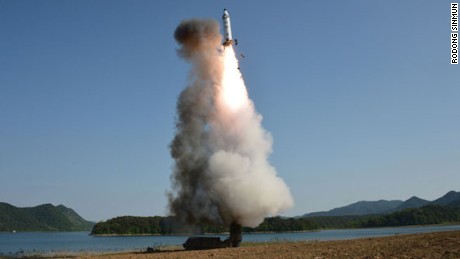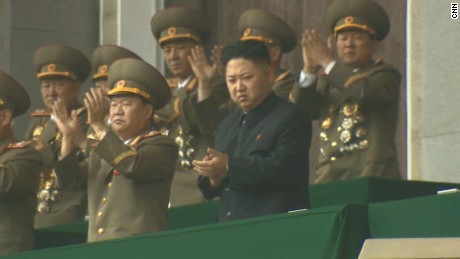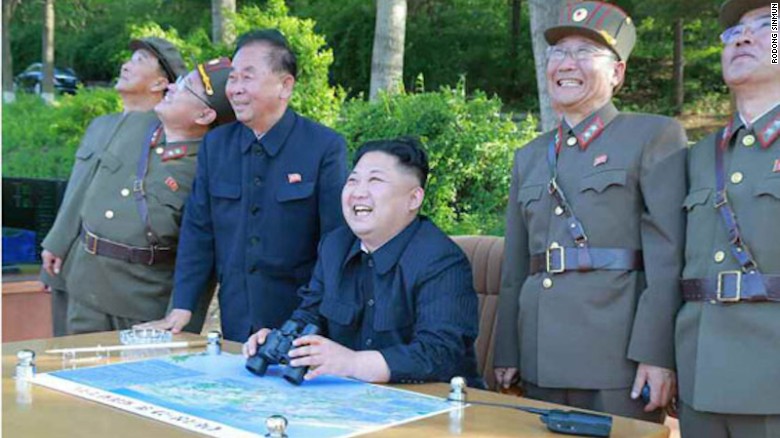North Korea test-fires another ballistic missile, US and South Korea say
North Korea fired a short-range ballistic missile Monday morning that landed in the ocean, the US military said.
South Korea and Japan immediately protested the missile launch, the most recent test-firing by North Korea as it seeks to develop nuclear weapons that can reach US military bases.
The missile was fired at 5:39 a.m. local time (4:39 p.m. Sunday ET) from an area near Wonsan, Kangwon province, toward the eastern part of the Korean Peninsula, according to a statement from South Korea's Joint Chiefs of Staff.
The missile was "assumed" to be one of the Scud series, the statement said.
"It flew about 450 kilometers," the statement said. "South Korea and the United States are currently closely analyzing for additional information. Our military is closely monitoring North Korean military and maintaining readiness posture."
US officials said it flew for about six minutes.
Japan said the missile landed within its Exclusive Economic Zone, an area of water extended 200 nautical miles from the Japanese coast.
"This launch is extremely problematic act for the safety of airplanes and ships and is clearly violating the UN resolution. The repeated provocative acts by North Korea is absolutely not acceptable," Japan's Chief Cabinet Secretary Yoshihide Suga said in a statement.
Japanese Prime Minister Shinzo Abe said a "firm protest" was lodged with North Korea.
"In order to deter North Korea, we will take concrete action together with the United States," he said. "We will maintain high vigilance in coordination with South Korea and the international community and take all possible measures to secure the safety of the people of Japan."
South Korea's Joint Chiefs of Staff on Monday warned North Korea against further provocations.
"North Korea's continuous provocative actions will cause its own isolation and it will be facing strong punishment from our military, South Korea and US alliance and the international community," a statement from the Joint Chiefs said.
The government of South Korean President Moon Jae-in, who took office in early May and who has advocated dialogue with the North, condemned Monday's launch.
"It is a severe threat to the peace and stability of not only the Korean peninsula, but also the international community," a statement from South Korea's Ministry of Foreign Affairs said. "Since our new government took office, North Korea has been frequently and repeatedly conducting provocation in such manner. This is in direct opposition to our demands in regards to the denuclearization and peace of the Korean Peninsula."
Monday's missile launch was North Korea's third in just over three weeks.

North Korea launches second missile in a week
On May 14, North Korea fired what analysts called its most successful test ever in its quest to develop ballistic missiles that can carry nuclear warheads.
That test reached an altitude of more than 2,100 kilometers (1,300 miles), according to North Korea. Analysts said that test gave North Korea critical information on developing a re-entry vehicle for nuclear warheads and showed Pyongyang had a missile capable of striking the US territory of Guam.

How much damage can North Korea's weapons do?
On May 21, Pyongyang sent a medium-range ballistic missile into the waters off its east coast. North Korea said that projectile was a ground-to-ground strategic ballistic missile Pukguksong-2, state news agency KCNA reported.
North Korean leader Kim Jong Un said the test showed the missile is ready for deployment and mass production, according to the state news agency KCNA.
As with a number of previous North Korean tests, the timing of Monday's launch came close to a key international event.
Less than two days earlier, Japan's Prime Minister Shinzo Abe met with US President Donald Trump, and five other leaders from some of the world's most powerful countries at the G-7 summit in Italy.
In their final communique, Abe and Trump -- along with the leaders of Canada, France, Germany, Italy and the United Kingdom -- said North Korea "increasingly poses new levels of threat of a grave nature to international peace and stability ... through its repeated and ongoing breaches of international law."
North Korea's May 14 test came as China was hosting a major economic summit in Beijing. In early April, Pyongyang tested a missile as Trump and Chinese President Xi Jinping prepared to meet at a summit in Florida.
North Korea has said its missile testing is in reaction to threats against it by the South, the United States and Japan.
News Courtesy: www.cnn.com











